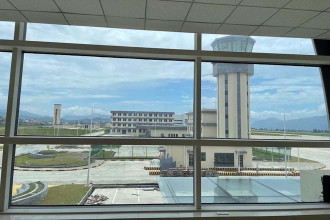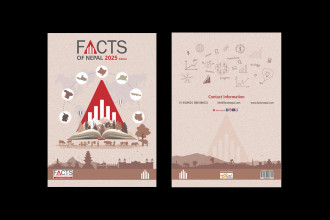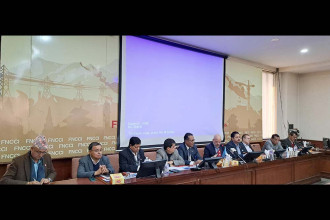-1731473572.jpg)
BAKU, AZERBAIJAN: President Ramchandra Paudel has called for the vast resources spent on arms to be redirected towards adaptation and mitigation efforts to protect human civilisation and ensure a habitable planet for future generations.
Speaking as the Leader of the Nepali Delegation at the CoP29 World Leaders Climate Action Summit in Baku, Azerbaijan, on Tuesday, the President highlighted the injustice faced by countries like Nepal, which are forced to divert resources originally allocated for poverty reduction towards climate adaptation and mitigation.
"While the pledges for climate funds have been insufficient to begin with, they have also remained unmet. It is even more distressing to note that the targeted communities do not receive the funds due to complicated processes," he said, urging the urgent implementation of the 'polluters pay and compensate' principle.
President Paudel also called for the swift operationalisation of the Loss and Damage Fund to support vulnerable developing countries. He emphasised that climate finance must recognise the contributions of countries like Nepal in protecting biodiversity, the Himalayan cryosphere, and freshwater supplies, and that these nations should be adequately compensated for climate-related loss and damage.
He stated that Nepal is committed to utilising natural resources sustainably and prudently, as the country implements its ambitious emission reduction targets set out in the second NDC, contributing to global well-being and the protection of the planet. "But the challenges precipitated by global warming and climate change far exceed our capacity and resources to manage them," he added.
-1731473572.jpg)
In his statement, delivered in Nepali, President Paudel also called for technology transfer and adequate capacity-building grants in line with the Paris Agreement and the commitments of developed countries. He stressed that climate finance must be provided in the form of grants and disbursed through national treasuries to ensure effectiveness.
The President expressed hope that the Conference would make concrete progress towards setting a clear New Collective Quantified Goal (NCQG) based on the principles of climate justice, equity, and capacity; towards limiting global warming to 1.5 degrees; and towards ensuring climate justice and sustainable development for least developed and Himalayan nations.
The full text of President Paudel's statement
Mr President, Excellencies, Distinguished Delegates, Ladies and Gentlemen,
I begin by earnestly thanking the Republic of Azerbaijan for organizing the 29th climate change conference.
Mr President,
1. Climate justice and reparations for loss and damage are my paramount concerns today.
2. Even though Nepal’s carbon emission is negligible, we are suffering terrible consequences of global warming and climate change. In fact we are reeling from some recent climate-related disasters--glacial lake outburst and devasting floods that caused damages worth tens of billions of rupees. The scale of destruction is so immense that recovery and reconstruction present a severe challenge given our limited resources and capacity.
3. Climate change has affected the whole planet, but its impacts have been especially severe in poor, least developed, developing nations and SIDS.
Mr President,
4. Nepal is committed to utilize natural resources sustainably and prudently. As we implement our ambitious emission reduction target set out in the second NDC, contributing to the global well-being and protection of mother earth. We have increased forest cover and enhanced production and supply of clean energy, to mention a few of our efforts.
5. But the challenges precipitated by global warming and climate change far exceed our capacity and resources to manage them.
Mr President,
6. We are compelled to divert our meagre resources, originally allocated for poverty reduction, towards adaptation and mitigation, which is a grave injustice. Urgent implementation of ‘polluters pay and compensate’ principle is critical, and they must also take responsibility for reducing emissions.
7. While the pledges for climate funds have been insufficient to begin with, they have also remained unmet. It is even more distressing to note that the targeted communities do not receive the funds due to complicated processes.
8. In this regard, I also call for urgent operationalization of the Loss and Damage Fund, which is intended to support the vulnerable developing countries. Climate finance must recognize the contributions of countries like Nepal in protecting biodiversity, the Himalayan cryosphere, as well as in supplying freshwater. These nations must also be adequately compensated for climate-related loss and damage.
9. I also call for technology transfer and adequate capacity building grants in accordance with the Paris Agreement and the commitment of developed countries.
10. Climate finance must be provided in the form of grants, and these should be disbursed through national treasuries to ensure effectiveness.
Mr President,
11. The vast resources spent for the arms should instead be redirected for adaptation and mitigation efforts to protect human civilization, and bequeath a habitable planet to future generations. Unofficial translation
12. I hope this Conference will make concrete progress towards setting out a clear NCQG vector based on the principle of climate justice, equity and capacity; towards limiting global warming to 1.5 degrees; and towards ensuring climate justice and sustainable development of least developed and Himalayan nations.
13. As the snow-covered white mountains turn into black rocks, the world needs to recognize that the effects are not limited to the mountainous nations but also extend to the coastal ones. Therefore, it is high time we formulate and implement integrated and holistic adaptation strategies that link mountains to the sea. Nepal is organizing ‘Sagarmatha Sambad’—Everest dialogue—to advance this important concept.
14. Finally, I reiterate that protecting Himalayas is protecting ourselves and entire humanity across the planet.
Thank you for attention.
By RSS
READ ALSO:






